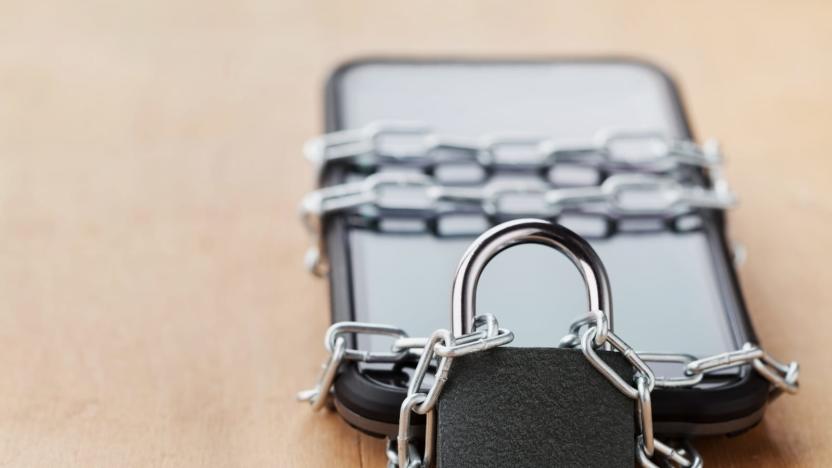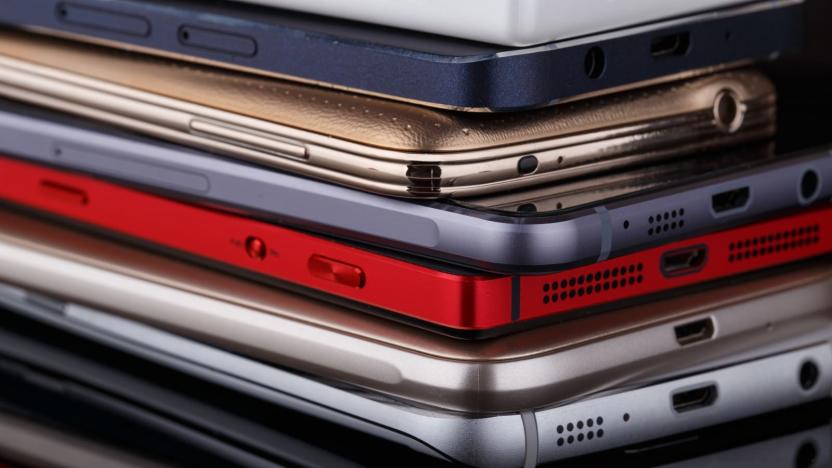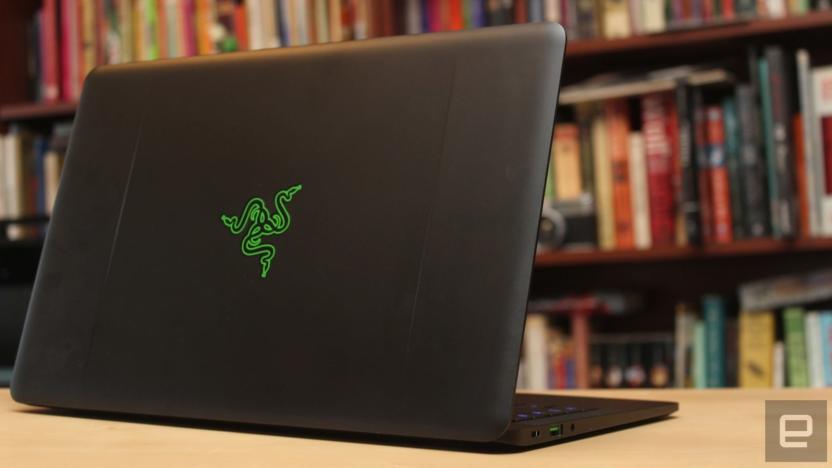mobilephone
Latest

UK plans to ban sales of locked mobile phones
The UK's communications regulator is proposing a rule to ban carriers from selling phones that are tied to their networks. O2, Sky, Three, Virgin Mobile and some smaller carriers already offer unlocked phones, but Ofcom wants the likes of BT Mobile/EE, Tesco Mobile and Vodafone to do the same. It's also seeking better clarity for customers about whether their handset is locked.

US delays tariffs on some Chinese-made electronics until December 15th
The Trump administration announced a tariff earlier this month on an additional $300 billion of Chinese imports that was to take effect from September 1st, but the 10 percent levy will only kick in then for about half of the goods. The tariff on others -- including mobile phones, laptops, monitors, game consoles, some toys and LED lamps -- is set to be enforced from December 15th.

A closer look at Vivo's all-glass, port-free concept 5G phone
Picture this: you're holding two glossy all-glass concept phones for a photo, then one slips off and shatters another unit on the table. The room goes quiet. Everyone looks on in awe. You are left red-faced not because you broke a phone, but because you broke one of the few rare units in existence. That was exactly what happened to me at yesterday's Vivo APEX event in Hong Kong.

Samsung's new DRAM chip will make phones run faster and longer
Samsung has been busy improving its microSD range, introducing SSDs with faster write speeds, and opening the world's biggest mobile factory, but the electronics maker doesn't appear to be slowing down any time soon -- it's just completed tests on a 8Gb LPDDR5 DRAM prototype, a faster, low power RAM that will be used to power machine learning applications and AI in 5G phones.

LocationSmart reportedly leaked phone location data onto the web
It's starting to feel like everyone in charge of our sensitive data might be incompetent. It's only been a day since Securus, the company that helps police track phones, was apparently hacked. Now, according to security site KrebsOnSecurity, tracking firm LocationSmart leaked real-time location data on its own web site.

Nextbit ends customer support for its Robin 'cloud phone'
When gaming peripheral maker Razer acquired Nextbit this past January, the phone maker promised to support the Robin, its beautiful yet flawed "cloud phone," providing updates and security patches through February 2018, along with warranty and customer support for another six months. Now that it's been that long, Nextbit tweeted that it has "shut down support for Robin" as of August 1st. A further clarification on Twitter notes that the company has "only ended customer support at this time, not software support." We've reached out to Nextbit and Razer for comment and will update when we hear back.

Razer is reportedly working on a phone just for gamers
Razer is known for its high-end gaming devices. The company has desktops and laptops, keyboards and mice, power banks and even projection systems aimed at core gamers. This past January, however, Razer acquired Nextbit and its "cloud phone" called the Robin. According to Bloomberg, that acquisition may pay off soon, as sources close to Razer say that the company plans to make a mobile phone targeted at gamers.

Dumb phone prices are no longer used to measure inflation
The UK's Office for National Statistics (ONS) measures inflation by looking at price increases among products the majority of consumers are spending their hard-earned on. And every year, the lists of stuff the ONS cares about keeping track of, called the "baskets of goods and services," are revised to reflect changes in our spending habits. Over the past few years, music and video streaming services, set-top boxes, digital game downloads and PS Plus and Xbox subscriptions have all been added to reflect their broad popularity, while sat navs and rewritable CDs/DVDs have been bumped due to their dwindling relevance. This year there's only one notable change, with dumb phones being dropped from the list of influential tech products.

UK grants new powers to remotely block illegal prison mobiles
Mobile phones have to be one of the most valuable kinds of prison contraband, where they're used for keeping in touch with loved ones all the way through to running criminal empires from behind bars. According to the UK government, close to 15,000 handsets and SIM cards were confiscated last year alone. But thanks to new powers granted to prison and police officers, they can now be disconnected remotely, removing the need to physically find the things to take them out of circulation.

ASUS ZenFone 3 Deluxe gets first dibs on Snapdragon 821 chip
We knew it wouldn't be long before ASUS rolls out its latest smartphones after the Computex unveiling, but it turns out the company has saved a little surprise for us. At the Taiwan and Hong Kong launch event today, ASUS revealed that its flagship 5.7-inch ZenFone 3 Deluxe has been given a chipset upgrade -- from Snapdragon 820 to the speedier Snapdragon 821 announced yesterday. And yes, it's officially the world's first device to feature this 2.4GHz processor, while still benefiting from the same old Cat 13 LTE radio, a slightly faster Adreno 530 GPU, dual-SIM support (Micro SIM plus Nano SIM) and Quick Charge 3.0.

DNA nanomachine detects HIV antibodies in minutes, not hours
Current methods for detecting the antibodies that indicate HIV infection are agonizingly slow and cumbersome. However a new DNA nanomachine developed by an international team of researchers (and funded, in part, by the Bill & Melinda Gates Foundation) could shorten the process to a matter of minutes.

It's been 30 years since Britain's first mobile phone call
Exactly 30 years ago today, two men made history by completing the first mobile phone call in the UK. As everyone celebrated the opening seconds of 1985, Michael Harrison, the son of former Vodafone chairman Sir Ernest Harrison, rang his father from Parliament Square in London. The call was supposed to be a surprise; Michael had snuck away from his family's New Year's Eve party in Surrey and driven up to the capital earlier that evening. In his possession was the Transportable Vodafone VT1, a cumbersome 5kg block with carry handle, antenna and tethered receiver. One of the network's technicians punched in the correct number and passed Michael the handset, as a curious crowd tried to work out who the minor celebrity was and exactly what he was doing. The call connected after just a few rings (perhaps it wasn't such a surprise for Sir Ernest Harrison) and the pair chatted briefly: "Hi Dad, it's Mike. Happy New Year. This is the first ever call on a UK mobile network."

Phone unlocking sees sharp increase in popularity following ban in January
When the US Library of Congress ruled to make the unlocking of smartphones illegal, its motive was (obviously) to discourage the practice. But it seems that since the ban on the practice was put into effect in January, at least one phone unlocking service has actually seen a rather drastic increase in customers wishing to free their mobile phones from the grasp of a specific carrier. As VentureBeat reports, UK-based Mobile Unlocked -- a company that provides remote unlocks for a wide range of iOS, Android and Windows Phone devices -- has seen its US sales spike by 71 percent since the ban. What's more, the company hasn't been actively advertising to American smartphone owners, and yet the US is the only territory in which sales are soaring. So what is driving the popularity of the practice? There are likely several factors here, including an increased awareness of easy-to-use unlocking options, a larger number of used smartphones being bought second-hand and of course the fact that doing something illegal is just plain fun. Wait, did I say that out loud?

Gartner: Android and Samsung dominate the phone market in Q1
If you've been following the trends, Gartner's mobile phone market figures for the first quarter of 2013 won't surprise. The research firm estimates that Android was on 74.4 percent of all smartphones sold in the period, with Samsung the key beneficiary of such dominance. While the Korean behemoth doesn't release solid sales figures, Gartner believes its market-flooding strategy has paid off, topping the league with 30.8 percent market share -- Apple has a firm grip on second place, with 18.2 percent, which is well ahead of LG, which has 4.8 percent. Samsung is also king of the mobile phone space, owning 23.6 percent of the market, ahead of Nokia, which has fallen to 14.8 percent share. Gartner's research also found that feature phone sales are slowing, so we guess that it's only a matter of time before the humble candybar goes the way of the netbook.

Apple overtakes Samsung as top US mobile phone vendor
Strategy Analytics' latest mobile phone report is out, and Apple's iPhone is the winner here in the US, taking the top spot for the first time in its history. Apple displaced Samsung, which has held the title as America's most popular mobile phone brand since 2008. According to Strategy Analytics, Apple shipped 17.7 million iPhones in the quarter and grabbed a 34 percent market share. Estimates for Samsung suggest the carrier shipped 16.8 million phones for a 32.3 percent market share. LG came in third with 4.7 million units that account for 9 percent of the mobile phone market here in the US. These numbers include both smartphones and feature phones, which makes Apple's chart-topping performance that much more impressive. [Via Apple Insider]

Gartner: smartphone sales up 47 percent in Q3, Android's OS market share increases (updated)
Third quarter figures from Gartner are out, reporting worldwide mobile phone sales slowed again in Q3 2012. Smartphones, however, showed a 46.9 percent increase in sales over the same period last year, with 169.2 million units sold. As you would imagine, Apple and Samsung sold the most, accounting for almost half of all worldwide smartphone purchases. Nokia sales declined during the quarter, and with only 7.2 million of its smartphones filling customers' hands, its ranking in this segment plummeted from third to seventh (although Gartner expects sales of the new Lumia devices should soften the fall in Q4). In contrast, Apple had a solid quarter, with sales up 36.2 percent year-on-year, which is expected to continue into the fourth quarter as the iPhone 5 launches in more markets. Samsung didn't do too bad either, increasing sales by 18.6 percent year-on-year thanks to its Galaxy range (although it's important to note this figure is for total phone sales, not just smartphones). In the OS wars, Android continued to grow its market share up to 72.4 percent, with iOS taking the second spot with 13.9 percent. Stalwart RIM made a leap into the top three with its BlackBerry OS, as aging Symbian saw its usage decline further. If you want to pour over the figures yourself, check out the source below. Update: We've tinkered with the post to remove some confusion between total mobile phone sales and smartphone sales. None of the figures have been changed.

ZTE's U950 shows how Tegra 3 phone is done under $160
This might not be the $199 Tegra 3 tablet that NVIDIA's keen to see, but hey, a 999 yuan ($160) quad-core phone is just as impressive. Unveiled in China earlier today, this ZTE U950 smartphone packs a 1.3GHz Tegra 3 chip, 1GB of RAM, 4GB of internal storage and a 2,000mAh battery beneath the 4.3-inch display. There's also a five-megapixel camera plus a VGA front-facing camera inside the 9mm-thick body. Pretty standard stuff for an Android 4.0 phone, except for the price-per-performance ratio, of course. The first 100,000 customers who register now will be eligible to order on November 11th, though chances are the quota's all gone by now.

Xiaomi Phone 2 officially launching in China on October 30th, 16GB and 32GB flavors offered
With all these Snapdragon S4 Pro phones popping up here and there, Xiaomi's finally announcing its launch plan for the retail version of its very own Xiaomi Phone 2 aka MI-Two, which is also powered by Qualcomm's APQ8064 SoC. Here's what's going to happen: on October 30th, the company's online store will release the first 50,000 units, followed by another 250,000 units (approximately) in mid-November. Additionally, the device will be offered in both 16GB and 32GB flavors, which are priced at ¥1,999 (about $320) and ¥2,299 (about $370), respectively. Folks who reside in China can now register online for a quota, but it'll probably be just a matter of time before we see these on eBay, anyway.

ASUS PadFone 2 review: two times is a charm for this phone-in-tablet combo
It's only been half a year since the peculiar PadFone made its much-delayed entry into select markets, and earlier this week, ASUS' launch of its second-gen phone-in-tablet brings us back to this old question: are we better off with just one mobile screen instead of two? Ask any ordinary manufacturer and the answer is likely the latter, because who doesn't want to sell more products? Similarly, carriers would likely back such manufacturers for the sake of selling more data plans, even if they admire ASUS' efforts (and they could already be selling ASUS tablets in the first place). Some folks also argue that if you have to carry the tablet module with you anyway, you might as well have two separate devices for better multitasking. It seems like there's a huge mountain to climb here, but on the flip side, ASUS' innovative differentiation does have some advantages. You only need one data plan (and no tethering required) for both form factors, you get to keep the same data in one place instead of having to duplicate them and you can pretty much instantly switch between a small screen and a large screen for the same content. Not to mention that there's also the added functionality of charging up the phone while it's sitting inside the tablet. Alas, the original PadFone and PadFone Station didn't quite hit the spot: the combined weight and bulk made it tough to justify the phone-in-tablet idea, which is why we said it's all about the PadFone 2 in our review. Let's see if ASUS has done it right this time 'round.%Gallery-168881%

KDDI unveils HTC J Butterfly (HTL21), the first phone with 5-inch 1080p display
We've been hearing about a certain 5-inch HTC phablet for Verizon since July, but it looks like its Japanese counterpart may actually hit the market first. Unveiled by KDDI as the HTC J Butterfly (HTL21), this Android 4.1 device is the first announced phone to feature a 5-inch, 440ppi full-HD "Super LCD 3" panel, and it's fittingly complemented by a 1.5GHz quad-core APQ8064 underneath, making this the latest member in the small family of Snapdragon S4 Pro phones. There's an eight-megapixel camera that naturally handles 1080p video at the back, accompanied by a 2.1-megapixel front-facing imager. Other details include 2GB RAM, 16GB internal storage, microSDHC expansion, 802.11a/b/g/n WiFi, Bluetooth 4.0 (LE), NFC, LTE and CDMA/GSM/UMTS/GPRS radios -- that's right, it's a global device. Not bad for a 140g package, and it's waterproof as well, rated at IPX5. But the question is how well will the 2,020mAh battery last under that super dense LCD and high-end processor? Only time will tell -- even KDDI has yet to finalize this part of the specs. Folks on the KDDI network can grab hold of this powerful phone in early December, with a choice of red, white or black. Update: HTC confirmed to us that this phablet will use panels supplied by Sharp and JDI.









